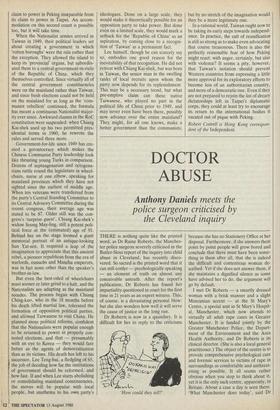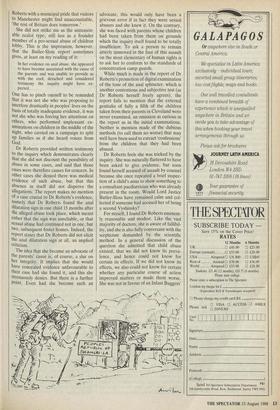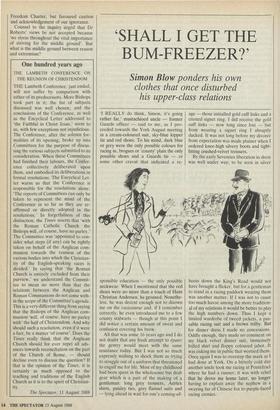DOCTOR ABUSE
Anthony Daniels meets the police surgeon criticised by the Cleveland inquiry THERE is nothing quite like the printed word, as Dr Raine Roberts, the Manches- ter police surgeon severely criticised in the Butler-Sloss report of the inquiry into child abuse in Cleveland, has recently disco- vered. So sacred is the printed word that it can still confer — psychologically speaking — an element of truth on almost any conceivable untruth. After the report's publication, Dr Roberts has found her impartiality questioned in court for the first time in 21 years as an expert witness. This, of course, is a devastating personal blow: but she also wonders how well it will serve the cause of justice in the long run.
Dr Roberts is now in a quandary. It is difficult for her to reply to the criticisms `How could they tell?' because she has no Stationery Office at her disposal. Furthermore, if she answers them point by point people will grow bored and conclude that there must have been some- thing in them after all, that she is indeed the difficult and contentious woman de- scribed. Yet if she does not answer them, if she maintains a dignified silence as some have advised her to do, the argument will go by default.
I met Dr Roberts — a smartly dressed woman with a brisk manner and a slight Mancunian accent — at the St Mary's Centre, a special unit in St Mary's Hospit- al, Manchester, which now attends to virtually all adult rape cases in Greater Manchester. It is funded jointly by the Greater Manchester Police, the Depart- ment of the Environment and the Area Health Authority, and Dr Roberts is its clinical director. (She is also a local general practitioner.) The object of the centre is to provide comprehensive psychological care and forensic services to victims of rape in surroundings as comfortable and unthreat- ening as possible. It all seems rather obvious when you stop to think about it, yet it is the only such centre, apparently, in Britain. About a case a day is seen there. `What Manchester does today', said Dr Roberts with a municipal pride that visitors to Manchester might find unaccountable, `the rest of Britain does tomorrow.'
She did not strike me as the unreason- able zealot type, still less as a founder member of a pro-sexual abuse of children lobby. This is the impression, however, that the Butler-Sloss report sometimes gives, at least on my reading of it:
In her evidence on anal abuse, she appeared to have become associated with the cause of the parents and was unable to provide us with the cool, detached and considered testimony the inquiry might have ex- pected. . . .
One has to pinch oneself to be reminded that it was not she who was proposing to interfere drastically in peoples' lives on the basis of totally inadequate evidence, it was not she who was forcing her attentions on others, who performed unpleasant ex- aminations on children in the middle of the night, who carried on a campaign to split up families as if she heard voices from God.
Dr Roberts provided written testimony to the inquiry which demonstrates clearly that she did not discount the possibility of abuse in some cases, and said that those cases were therefore causes for concern. In other cases she denied there was medical evidence of such abuse, but that this absence in itself did not disprove the allegations. The report makes no mention of a case crucial to Dr Roberts's evidence, namely that Dr Roberts found the anal dilatation sign in one child 15 months after the alleged abuse took place, which meant either that the sign was unreliable, or that sexual abuse had continued not in one, but two, subsequent foster times. Indeed, the report states that Dr Roberts did not elicit the anal dilatation sign at all, an implied criticiSm.
The idea that she became an advocate of the parents' cause is, of course, a slur on her integrity. It implies that she would have concealed evidence unfavourable to their case had she found it, and this she strenuously denies. But there is a further point. Even had she become such an advocate, this would only have been a grievous error if in fact they were sexual abusers and she knew it. On the contrary, she was faced with parents whose children had been taken from them on grounds which the inquiry itself found to be totally insufficient. To ask a person to remain utterly unmoved in the face of this assault on the most elementary of human rights is to ask her to conform to the standards of concentration camp guards.
While much is made in the report of Dr Roberts's promotion of digital examination of the tone of the anal sphincter, which is another contentious and subjective test (as Dr Roberts herself freely agrees), the report fails to mention that the external genitalia of fully a fifth of the children taken from their parents in Cleveland were never examined, an omission as curious in the report as in the initial examinations. Neither is mention made of the dubious methods (to call them no worse) that may well have been used to extract 'confessions' from the children that they had been abused.
Dr Roberts feels she was tricked by the inquiry. She was naturally flattered to have been asked to give evidence, but soon found herself accused of assault by counsel because she once repeated a brief inspec- tion of a child's anus to show something to a consultant paediatrician who was already present in the room: Would Lord Justice Butler-Sloss have remained calm and col- lected if someone had accused her of being a second Vyshinsky?
For myself, I found Dr Roberts eminent- ly reasonable and modest. Like the vast majority of doctors, she is aware of fallibil- ity, and she is also fully conversant with the scepticism demanded by the scientific method. In a general discussion of the question she admitted that child abuse existed, that we did not know its preva- lence, and hence could not know for certain its effects. If we did not know its effects, we also could not know for certain whether any particular course of action improved matters or made them worse. She was not in favour of an Infant Buggers' Freedom Charter, but favoured caution and acknowledgement of our ignorance.
Counsel to the inquiry urged that Dr Roberts' views be not accepted because 'we stress throughout the vital importance of striving for the middle ground'. But what is the middle ground between reason and extremism?
























































 Previous page
Previous page